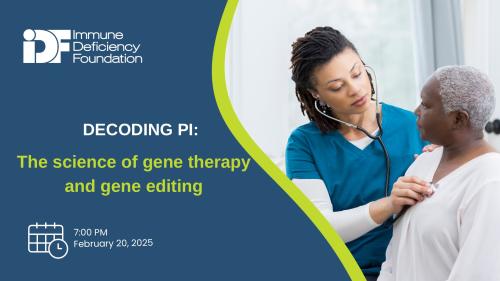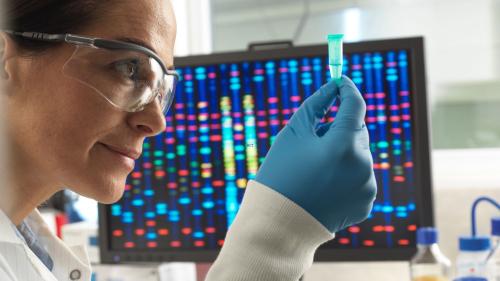
-
Understanding primary immunodeficiency (PI)

Understanding PI
The more you understand about primary immunodeficiency (PI), the better you can live with the disease or support others in your life with PI. Learn more about PI, including the various diagnoses and treatment options.
-
Living with PI
-
Addressing mental health
-
Explaining your diagnosis
- General care
- Get support
- For parents and guardians
-
Managing workplace issues
- Navigating insurance
-
Traveling safely

Living with PI
Living with primary immunodeficiency (PI) can be challenging, but you’re not alone—many people with PI lead full and active lives. With the right support and resources, you can, too.
-
Addressing mental health
-
Get involved

Get involved
Be a hero for those with PI. Change lives by promoting primary immunodeficiency (PI) awareness and taking action in your community through advocacy, donating, volunteering, or fundraising.
-
Advancing research and clinical care
-
Grants
-
IDF surveys
-
Participating in clinical trials
-
Diagnosing PI
-
Consulting immunologist
-
Clinician education

Advancing research and clinical care
Whether you’re a clinician, researcher, or an individual with primary immunodeficiency (PI), IDF has resources to help you advance the field. Get details on surveys, grants, and clinical trials.
-
Grants
The Irish Traveller population has a higher than average prevalence of severe combined immunodeficiency (SCID), similar to the Navajo Nation and the Amish and Mennonite communities, and international SCID experts are collaborating to identify SCID variants and improve treatment.
Dr. Jolan Walter, division chief of the University of South Florida and Johns Hopkins All Children’s Pediatric Allergy and Immunology Programs, along with Dr. Stanton Goldman, principal investigator for the Children’s Oncology Group of Medical City Dallas and chief medical officer for Medical City Children’s Hospital, presented “SCID Variants and the Irish Family” during the 2021 SCID Compass Summit.
Who are the Irish Travellers? They are a tight-knit ethnic minority of Irish descent that number about 70,000 globally, with the majority living in pockets throughout Ireland and about 25,000 living in the U.S., the United Kingdom, and Canada. The Irish Travellers, known in the U.S. as the Irish Family, generally marry within their community.
Among the Irish Traveller population in the country of Ireland, the infant mortality rate is three and half times that of the general population. There are between 650 and 850 Irish Traveller babies born each year in Ireland and 10 percent do not live past their second birthday. The main causes of mortality are accidents, congenital malformations, and inherited metabolic disorders.
Over 104 genetic disorders exist in the Irish Traveller community in Ireland, a very high number of genetic defects for such a small population, said Dr. Walter. Among the genetic diseases are variants of SCID, including recombination-activating gene (RAG), adenosine deaminase deficiency (ADA), and Omenn’s Syndrome.
“What we were trying to determine is how much of these genetically related disorders are affecting the health of this population. In the U.S., not much is known, but we think it’s probably not as severe as in Ireland,” said Dr. Walter.
Drs. Walter and Goldman work closely with SCID experts in Ireland and the United Kingdom to share data and studies concerning the Irish Travellers.
“Through this international collaboration, we think that these genetic defects were probably in the gene pool for decades and hundreds of years and I must mention that in talking to the families, there is still a lot of migration happening from Ireland and people going back to Ireland and marrying people in Ireland, so there is a possibility that there is a constant influx of genetic enhancement through these processes,” said Dr. Walter.
Listen to “SCID Variants and the Irish Family.”
Related resources
Sign up for updates from IDF
Receive news and helpful resources to your cell phone or inbox. You can change or cancel your subscription at any time.





The Immune Deficiency Foundation improves the diagnosis, treatment, and quality of life for every person affected by primary immunodeficiency.
We foster a community that is connected, engaged, and empowered through advocacy, education, and research.
Combined Charity Campaign | CFC# 66309



